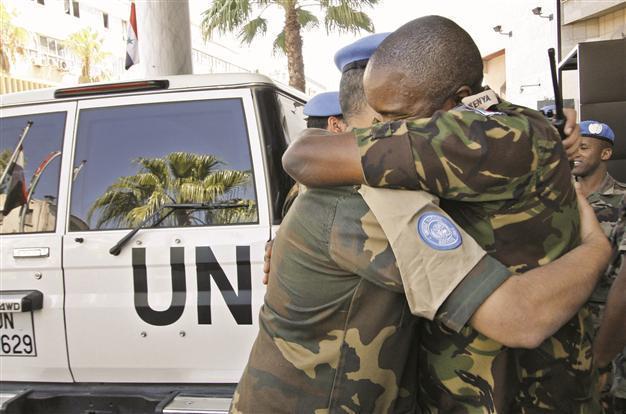Turkey sets 100,000 limit for Syrian refugee influx
Serkan Demirtaş / Analysis ANKARA - Hürriyet Daily News

UN observers embrace each other in Damascus as they start departing Syria. REUTERS photo
Turkey’s efforts to create security zones with humanitarian purposes on Syrian soil can bear no result in the near future as the United States shows no sign of willingness to support or take part in such an action amid the increasing numbers of Syrians fleeing the violence-hit country and taking shelter in Turkey.That being said, if Turkey’s efforts result in a global consensus, the only viable country to lead forming security zones in Syria seems to be the United States since Arab countries, such as Qatar and Saudi Arabia, would object to Ankara’s leadership.
In an attempt to push its allies on the Syrian crisis in this end, Turkey, which is presently hosting nearly 70,000 Syrians on its soil and establishing new tent cities to shelter up to 100,000 refugees, has designated 100,000 as the limit and warned that if the number exceeds that it would have to welcome Syrians on its neighbor’s soil. “If the number of refugees exceeds 100,000, we will not be able to shelter them [the Syrians],” Turkish Foreign Minister Ahmet Davutoğlu told daily Hürriyet in an interview published yesterday. “We should welcome them [the Syrians] inside Syria. The United Nations can set up camps in a safe haven inside Syria.”
Although Turkey and the United States have begun work on potential contingency plans to operate inside Syria, Washington is against determining a certain number of refugees as a threshold to establish security zones to host fleeing Syrians inside their territory.
“I do not think there is a magic number we will reach and say ‘OK! It’s time to undertake some military action or something like that. Neither your government or mine is speaking in these terms, to my knowledge,” said the U.S. ambassador to Turkey, Francis Ricciardone, last week during a meeting with reporters.
With France resuming the chairmanship of the U.N. Security Council, efforts to convince Syria’s staunch allies, Russia and China, to drop their vetoes on a resolution paving the way for the international community to act together will be revisited, though with slim chances.
Technical and political difficulties
In the absence of a U.N. resolution, the only viable option to force a transition in the crisis-hit country seems to be the launch of a U.S.-led campaign to carry out a humanitarian and military operation inside Syria.
Talking about establishing security or buffer zones inside Syria and limiting the Syrian Air Force’s activities through a no-fly zone requires a massive military campaign, which requires high technical and command capabilities. Besides, political sensitivities should also be observed in the creation of such a coalition, according to diplomatic observers.
Qatar and Saudi Arabia, Turkey’s closest allies on the Syrian crisis, would not give the green light to Turkey’s leadership in such a coalition or to its unilateral action given the historical facts.
Qatar and Saudi Arabia, sponsors of the Syrian opposition and its Free Syrian Army, are unlikely to lead such a campaign in Syria due both military and political reasons.
With the reluctance of European countries and NATO to get the ball rolling, the United States has become the only power on which Turkey, Qatar and Saudi Arabia agree to lead a potential multilateral military campaign.
At this point the unwillingness of Washington to militarily engage in Syria is the most important hurdle before the plans of Turkey, Qatar and Saudi Arabia can be realized.
















